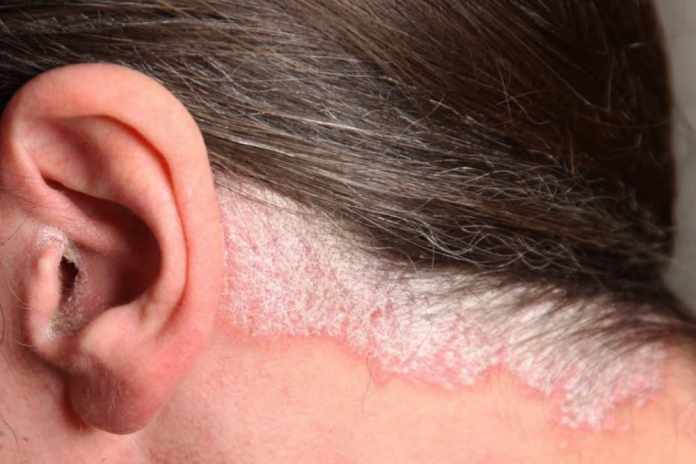Anyone who suffers from psoriasis knows that it can be an itchy, uncomfortable, and even painful condition. But do you know what the main cause of psoriasis is?
The answer lies in the keratinocytes. What are the keratinocytes? Let’s break it down. The suffix -cyte in Greek means ‘cell’ (or, more literally, ‘vessel’). Keratin, on the other hand, is a fiber-like structural protein present in our hair and skin. Keratinocytes are, simply put, skin cells. Here are 7 facts that everyone with psoriasis should know about these incredible cells!
Table of Contents
1. Part of a Power Trio
Keratinocytes are one of three major components of our epidermis. The epidermis forms the primary layers of skin that we can see.
While they comprise around 90% of our skin, they’re not alone. They’re joined in the epidermis by our melanocytes. Melanocytes are responsible for producing melanin, a skin-darkening chemical. Without melanin, your skin would have no color, and next to no protection from the sun. Lastly, they are supported by Langerhans cells, which form part of our immune system.
2. Keep You In, and the Outside Out
Our skin’s main role is to serve as a barrier between our vulnerable internal systems and the outside world. Keratinocytes, when tightly-bound together, form barriers against foreign substances. These include infections, harsh chemicals, water, et cetera. This barrier also helps keep all the various liquids moving inside you from sloshing out, while still remaining breathable enough to allow sweat and other waste products out.
3. Protect You From the Sun
In keeping the outside world out, keratinocytes also help protect you from the most harmful effects of ultraviolet (UV) rays. The effects of UV radiation on the skin are terrifying. Imagine the damage it could cause if it hit our muscles and blood vessels!
This is part of the reason why maintaining your skin’s barrier integrity is crucial to lasting health. That includes protecting your skin from UV radiation as much as possible. For tips on how to do that, see this article.
4. Regulate Your Body
Your skin is a critical part of your body maintaining homeostasis. Homeostasis is basically what keeps our bodies running 24/7 like well-tuned machines. All of our internal systems exist in a delicate balance that requires slim margins of error to work. If we couldn’t maintain homeostasis, this internal balancing act, our bodies would break down far sooner.
Between keeping infections out and helping to regulate our body temperature through releasing sweat, our skin plays a key role in this delicate, daily maintenance.
5. Play a Key Role in Psoriasis Symptoms
This should seem obvious since psoriasis mainly shows up on your skin, but keratinocytes play a large part in the most common and most visible symptom of psoriasis. Psoriasis flakes and scales happen because your keratinocytes multiply more than is necessary in response to some trigger to the immune system.
So, what causes a flare-up? Here are a few possible triggers:
- Stress: Stress sends our immune systems into overdrive, which causes skin cells to build up rapidly.
- Infection: Anything that throws your immune system out of whack is going to trigger a flare, and nothing fires up those systems like an infection.
- Wounds: Any sort of cut, bruise, burn, or external trauma to the skin will likely trigger an immune reaction, and thus, a psoriasis flare.
- Medications: Any medication known to have an adverse effect on your immune response can potentially worsen symptoms.
- Cold or Dry Air: If your skin has to go into overdrive to maintain homeostasis, either due to harsh cold or lack of external moisture, a flare isn’t far behind.
If you want some help managing your symptoms or flares naturally, check out this list of psoriasis treatments for more information.
6. Support Your Skin Ecosystem
Did you know that your skin contains an entire microbiome of beneficial bacteria? It seems contradictory, but your skin surface bacteria is crucial to maintaining a healthy complexion. Stripping your skin of its natural symbiotic bacteria with harsh chemicals can actually cause far more harm than good.
For more information on the benefits of maintaining a healthy skin microbiome, this blog has you covered.
7. Useful for Critical Medical Research
Samples of keratinocytes get used in all types of medical studies and are crucial to advancing our understanding and treatment of various conditions. In addition to the obvious fields of study such as skin cancer, psoriasis, or other dermatological conditions, our skin cells help many other fields.
Since stem cells play a vital role in skin regeneration, keratinocytes can aid in stem cell research. This also helps us learn about skin engineering, which is critical for those suffering severe burns. We can also find these cells in our oral mucosa, meaning they can contribute to studies involving our mucous membranes as well. Oral keratinocytes also help us better understand how our gums and mouths function, which allows for advances in dentistry.
Impressive Body of Work, Right?
Keratinocytes, as a massive part of the largest organ in our body, have many roles they play. Understanding these roles can help you better understand your psoriasis symptoms, and why they occasionally flare-up.
With this knowledge in mind, you can go forward knowing more than you did before about your body’s greatest guardian and, hopefully, with some ideas of how to protect this precious barrier!
If you liked learning more about your skin, and want more health-related articles, please check out our blog for more content like this!
















